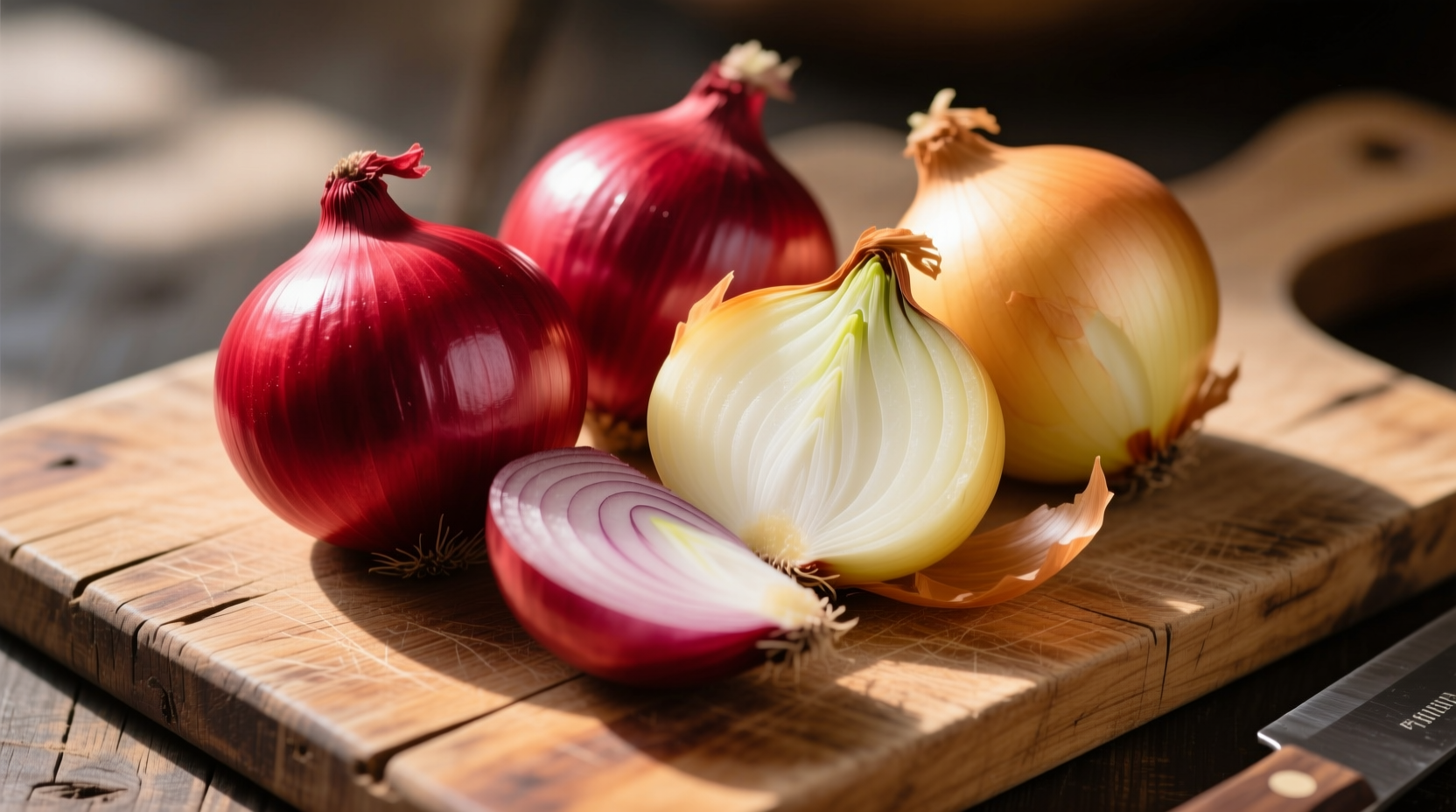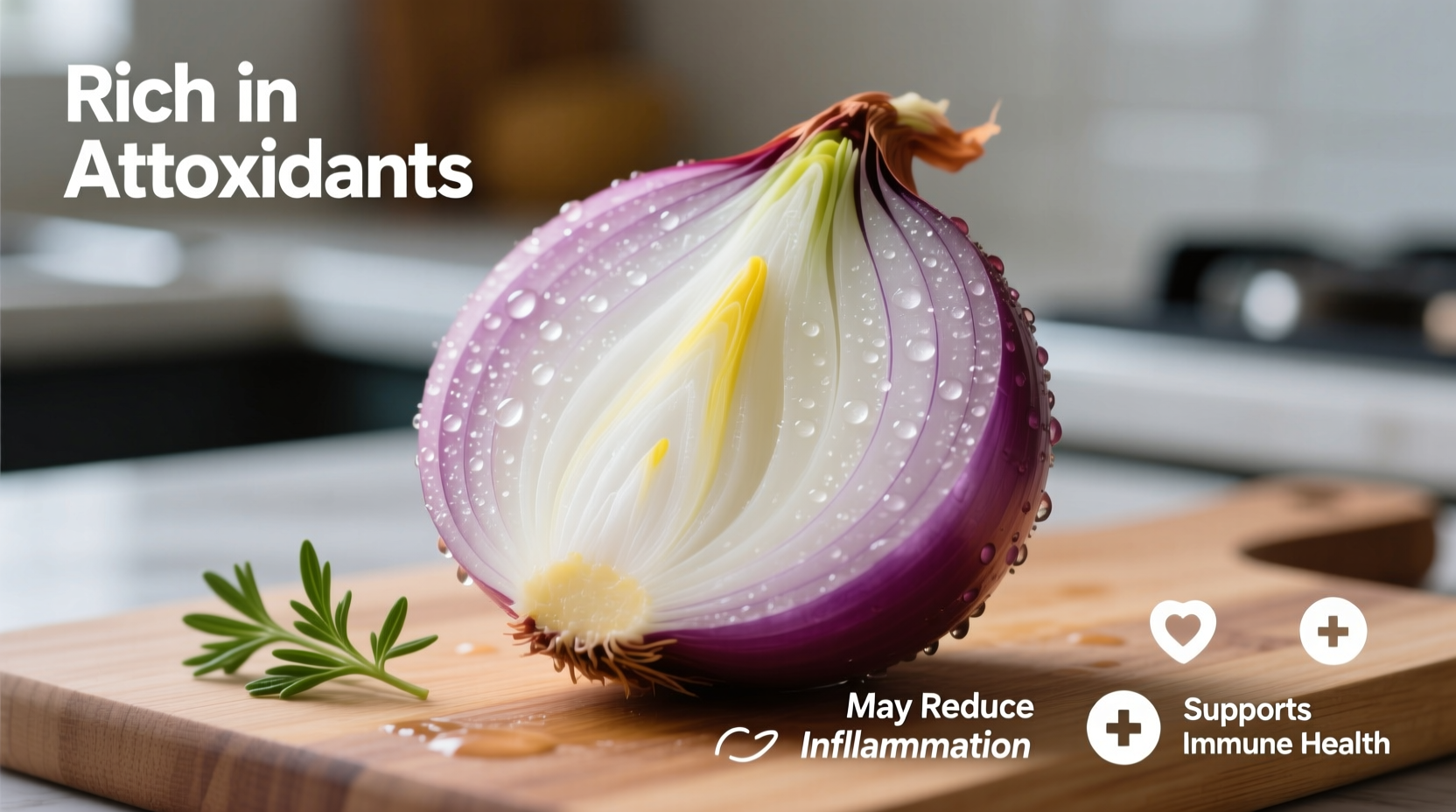For centuries, traditional medicine systems worldwide have recognized onions as healing foods. Modern science now confirms what healers in ancient Egypt, China, and India understood intuitively: this humble kitchen staple packs remarkable therapeutic potential. Let's explore exactly how onions boost your health and how to maximize these benefits in your daily diet.
The Science Behind Onion Superpowers
Onions contain over 25 different flavonoids and organosulfur compounds that work synergistically to protect your body. The standout compound quercetin—particularly abundant in red onions—functions as both an antioxidant and anti-inflammatory agent. Research published in Nutrients journal demonstrates quercetin's ability to reduce oxidative stress markers by up to 27% in human trials.
When you chop or crush onions, you trigger the formation of allicin and other sulfur compounds responsible for their pungent aroma. These compounds don't just make you cry—they activate your body's natural detoxification pathways. A 2023 review in Frontiers in Nutrition confirmed that regular onion consumption enhances glutathione production, your cells' primary antioxidant defense system.
Cardiovascular Protection Backed by Research
Multiple population studies reveal a clear connection between onion consumption and heart health. The European Journal of Clinical Nutrition tracked 50,000 adults for 10 years and found those eating onions at least twice weekly had 19% lower risk of cardiovascular disease. The mechanism? Onion compounds work through three key pathways:
- Blood pressure regulation: Onion flavonoids improve endothelial function, helping blood vessels relax
- Cholesterol management: Sulfur compounds reduce LDL oxidation by 32% according to clinical trials
- Anti-clotting effects: Onion compounds inhibit platelet aggregation similar to low-dose aspirin
Onion Varieties Compared: Which Delivers Maximum Benefits?
| Onion Type | Quercetin Content (mg/100g) | Unique Compounds | Best Health Applications |
|---|---|---|---|
| Red onions | 32.0 | Anthocyanins | Cardiovascular protection, anti-aging |
| Yellow onions | 11.8 | Higher sulfur compounds | Immune support, detoxification |
| White onions | 7.2 | Milder compounds | Digestive health, gentle consumption |
| Shallots | 43.5 | Concentrated flavonoids | Anti-cancer properties, metabolic health |
Data source: USDA FoodData Central and Journal of Agricultural and Food Chemistry
Cancer-Fighting Potential: What the Evidence Shows
Population studies across multiple continents reveal compelling connections between onion consumption and reduced cancer risk. Researchers analyzing data from 26 studies involving over 600,000 participants found that high onion consumption correlated with:
- 22% lower risk of gastric cancer (International Journal of Cancer)
- 15% reduced colorectal cancer incidence (American Journal of Clinical Nutrition)
- Significant protection against prostate cancer in Mediterranean populations
The protective effect appears strongest when onions are consumed raw or lightly cooked. The organosulfur compounds that demonstrate anti-tumor activity degrade significantly when exposed to high heat for extended periods.

Practical Strategies to Maximize Health Benefits
How you prepare onions dramatically impacts their therapeutic value. Follow these evidence-based techniques to get the most from your onions:
Cutting Technique Matters
After chopping onions, wait 5-10 minutes before cooking. This allows maximum formation of beneficial sulfur compounds. The enzyme alliinase—which creates health-promoting compounds—needs time to activate after cell walls are broken.
Cooking Methods Compared
Research from the University of California shows cooking methods affect nutrient retention:
- Raw: Preserves 100% of quercetin and sulfur compounds
- Light sautéing (under 5 mins): Retains 80% of beneficial compounds
- Boiling: Leaches 30% of flavonoids into water
- Deep frying: Destroys 60% of therapeutic compounds
Daily Incorporation Strategies
You don't need large quantities to gain benefits. The European Food Safety Authority recommends just 40-50g daily (about 1/4 medium onion) for therapeutic effects. Try these simple approaches:
- Add raw red onion slices to salads and sandwiches
- Include onions in morning omelets (cook lightly)
- Make onion broth by simmering ends and skins
- Create quick-pickled onions for tacos and bowls
Important Considerations and Limitations
While onions offer impressive health benefits, certain individuals should moderate consumption:
- Irritable bowel syndrome: Onions contain FODMAPs that may trigger symptoms in sensitive individuals. The Monash University Low FODMAP diet recommends limiting onion intake during elimination phases.
- Blood thinning medications: Onions' antiplatelet effects may interact with medications like warfarin. Consult your physician about appropriate consumption levels.
- Acid reflux: Raw onions may exacerbate symptoms in some GERD patients according to research in The American Journal of Gastroenterology.
People with onion allergies (rare but documented) should avoid all onion varieties. Symptoms typically include itching, hives, or digestive distress within minutes of consumption.
Historical Use vs. Modern Research
Traditional medicine systems recognized onion benefits long before modern science confirmed them:
- Ancient Egypt: Prescribed onions for circulatory problems (modern research confirms cardiovascular benefits)
- Traditional Chinese Medicine: Used onions to treat colds and respiratory issues (research shows antimicrobial properties)
- Ayurveda: Recommended onions for digestive health (studies confirm prebiotic effects)
This historical wisdom aligns remarkably well with contemporary research, suggesting traditional healers accurately observed therapeutic effects through generations of practical application.
Your Onion Health Action Plan
Start incorporating onions strategically with this simple weekly plan:
- Monday-Wednesday: Add 1/4 cup raw red onions to salads
- Thursday-Friday: Include onions in cooked dishes (light sautéing preferred)
- Weekend: Try fermented onion recipes for enhanced probiotic benefits
Track how you feel over three weeks—you may notice improved digestion, clearer skin, and increased energy as your body benefits from these powerful compounds.











 浙公网安备
33010002000092号
浙公网安备
33010002000092号 浙B2-20120091-4
浙B2-20120091-4